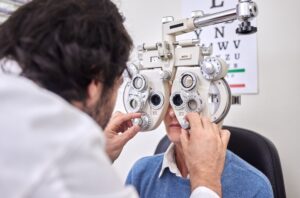Optometrists provide eye care, such as eye tests, to the public in opticians. They are responsible for examining your eyes for abnormalities, detecting injury or eye disease and identifying whether you need any treatment for your eyes or referrals. If an optometrist did not refer you to a hospital when you needed it, and this made an injury or condition worse, you may be able to make an optometrist negligence claim.
In this guide, we discuss the optometrist negligence claims eligibility criteria to help you determine if you have an eligible claim. We also discuss what harm could be caused if an optometrist did not refer you to a local hospital when you were showing clear symptoms of an eye condition that needed to be treated by ophthalmologists.
As you continue through this guide, we look at how to prove you sustained avoidable harm and how an optometrist or a registered dispensing optician could be liable for such harm. We additionally look at how optometrist negligence compensation is determined.
This guide concludes by discussing how to make a No Win No Fee optometrist negligence claim with a solicitor from our expert panel. By contacting us, we can confirm the eligibility of your claim. Contact us today by:
- Phoning 0161 696 9685.
- Submitting our Contact Form.
- Messaging in our live chat feature.
Jump To A Section
- How To Claim If An Optometrist Did Not Refer You To A Hospital
- When Can You Claim If An Optometrist Did Not Refer You To A Hospital?
- What Evidence Can Support An Optometrist Negligence Claim?
- What Is The Average Payout For Negligence By An Optometrist?
- No Win No Fee Optometrist Negligence Claims
- Related Guides For Eye Injury Claims
How To Claim If An Optometrist Did Not Refer You To A Hospital
When you visit the opticians, you are owed a duty of care. This means you must be provided with a service of reasonable skill and care. When you visit the opticians, it is vital that the person carrying out the eye test check for any conditions that may need a referral to an ophthalmologist in order for you to get the treatment you need.
If the optometrist failed to refer you to a hospital for an eye condition you were suffering from because they failed to provide you with the correct standard of service, this is known as them breaching their duty of care, for which you could be eligible to make a claim for any avoidable suffering caused.
If the optometrist provided you with the correct standard of care but missed an eye condition that needed a referral to a hospital, a claim is less likely.
Thus, you may have an eligible optometrist negligence claim if you meet and can prove these criteria:
- A duty of care was owed to you.
- This duty of care was breached.
- You suffered an injury or further harm because of this breach.
Optometrists have the ability to spot eye problems or disease through eye tests, if you are showing clear symptoms in such examinations, but their negligent action means you are not referred to a hospital for tests or further examinations, you could suffer permanent damage for which you could make a claim. Contact us to discuss your situation and receive further advice.
How Long Do You Have To Claim?
Your optometrist negligence claim will only be eligible if you begin your claim within the legal limitation period, as declared in the Limitations Act 1980. This time limit is 3 years and starts from either the date you suffered your harm from a breach of duty of care or the date you knew that a breach of duty of care caused your avoidable harm.
There are only a couple of circumstances where this time limit will be suspended for the claimant, such as if the injured party is a minor or has reduced mental capacity. To enquire more about these exceptions, please get in touch with us. We will now discuss what actions can be considered negligent and what kinds of harm can result from a delayed referral.
When Can You Claim If An Optometrist Did Not Refer You To A Hospital?
To adhere to their duty of care, optometrists should refer you to a hospital for further tests either to see a specialist, to an ophthalmologist or oncologist, or for treatment if you show symptoms of the following conditions:
- Eye cancer.
- Glaucoma.
- Macular degeneration.
- Cataracts.
- Diabetic retinopathy.
- Loss of sight or partial loss of sight.
If they fail to identify symptoms for these conditions, fail to listen to your concerns or send you for further investigations or tests, or give you the incorrect medication/treatment from misdiagnosis, then these conditions can get worse over time and put your health at significant risk.
Please don’t hesitate to contact us today if you are suffering harm because an optometrist did not refer you to a local hospital.
What Evidence Can Support An Optometrist Negligence Claim?
To make a claim, the optometrist must have breached their duty of care, and this must have caused you harm you would not have otherwise suffered. This means you will need evidence to prove both of these facts.
So, the types of evidence you need to collect are:
- Evidence to show that an optometrist owed you a duty of care. For example, a letter that dates the eye test appointment you had with them.
- Copies of medical records.
- Details of any witnesses who attended the appointment with you.
- A diary detailing your symptoms.
- Photographs of your eye injury if it is visible.
- A copy of the written complaint about the opticians.
If you are connected and represented by an eye injury solicitor from our panel, they can assist you in collecting the evidence. So, contact us for further advice.
What Is The Average Payout For Negligence By An Optometrist?
Compensation payouts for successful optometrist negligence claims can comprise up to two heads of claim.
The physical and psychological effects make up your general damages head of claim. Some effects that are looked at include:
- Your quality of life.
- The length of your recovery.
- How severe your physical and mental injury pain is.
The value of your general damages will be calculated very often by looking at your report from your independent medical assessments and the Judicial College Guidelines (JCG). The JCG is a document containing guideline compensation brackets for different injuries.
Compensation Table
You can find guideline compensation brackets for different eye injuries in the table below, taken from the JCG (apart from the very first row, which is not from the JCG). All figures are for guidance only.
| Injury | Severity | Guideline compensation bracket | Notes |
|---|---|---|---|
| Multiple serious injuries and their special damages | Serious | Up to £1,000,000+ | Multiple serious injuries and their costs such as loss of earnings. |
| Injuries affecting sight | Total blindness (b) | In the region of £268,720 | Complete loss of sight in both eyes. |
| Loss of sight in one eye with reduced vision in the remaining eye (c) (i) | £95,990 to £179,770 | Serious risk of the remaining eye becoming worse, including developing sympathetic ophthalmia. | |
| Loss of sight in one eye with reduced vision in the remaining eye (c) (ii) | £63,950 to £105,990 | Where problems in the remaining eye include double vision. | |
| Total loss of one eye (d) | £54,830 to £65,710 | Award depends on psychiatric and cosmetic effect. | |
| Complete loss of sight in one eye (e) | £49,270 to £54,830 | Where there is some risk of sympathetic ophthalmia and scarring around the eye. | |
| Serious but incomplete loss of vision in one eye (f) | £23,680 to £39,340 | No major risk of reduced sight in the remaining eye. | |
| Minor but permanent impairment of vision in one or both eyes (g) | £9,110 to £20,980 | Where sensitivity to light is permanent. | |
| Minor (h) | £3,950 to £8,730 | Temporary interference with sight. |
Special Damages
The financial losses from the avoidable harm make up your special damages head of claim. However, special damages are not always awarded since you need evidence to prove your avoidable harm’s financial losses. Such evidence can be receipts, bank statements, invoices and payslips.
Some financial losses that could be incurred include:
- Medical costs.
- Loss of earnings.
- Travel expenses.
To learn more about how compensation is determined for successful claims, please contact us.
No Win No Fee Optometrist Negligence Claims
Why should you choose our panel of solicitors to help recover damages if you have suffered unnecessary harm because an optometrist did not refer you to a hospital? Apart from the fact that they are experts, they can help collect all your evidence, and ensure your claim is filed on time and in full, they also work under a Conditional Fee Agreement (CFA), which is a type of No Win No Fee contract.
If you are making an optometrist negligence claim with a solicitor under a CFA, you do not have to pay any fees for your solicitor’s services unless your claim is successful. This includes before and during the claims process and for unsuccessful claims.
If you win your claim, you will be awarded compensation for which your solicitor will take a legally capped percentage of your award, known as the success fee. The law caps the percentage that solicitors can take for their success fee to ensure you still get the larger part of your compensation.
Contact Us
If you want to benefit from the work that our panel of solicitors do, don’t hesitate to contact us today. We want to help you if you have suffered harm that could have been prevented. Get in touch by:
- Phoning 0161 696 9685.
- Submitting our Contact Form.
- Messaging in our live chat feature.
Related Guides To Eye Injury Claims
For related information, see our similar guides:
- Read about claiming compensation for loss of vision or blindness if you have lost your vision due to a medical professional breaching their duty of care.
- If your child has an eye injury, learn about child injury claims.
- Find out about cancer misdiagnosis claims if you are not referred for eye cancer.
These external resources may also benefit you:
- Cancer Research UK – information about seeing your GP if you have symptoms of eye cancer.
- NHS – information about visiting opticians.
- NHS – a guide to eye injuries.
Thank you for reading our guide on how to claim compensation if an optometrist did not refer you to a hospital and, as a result, you are suffering from preventable harm.




